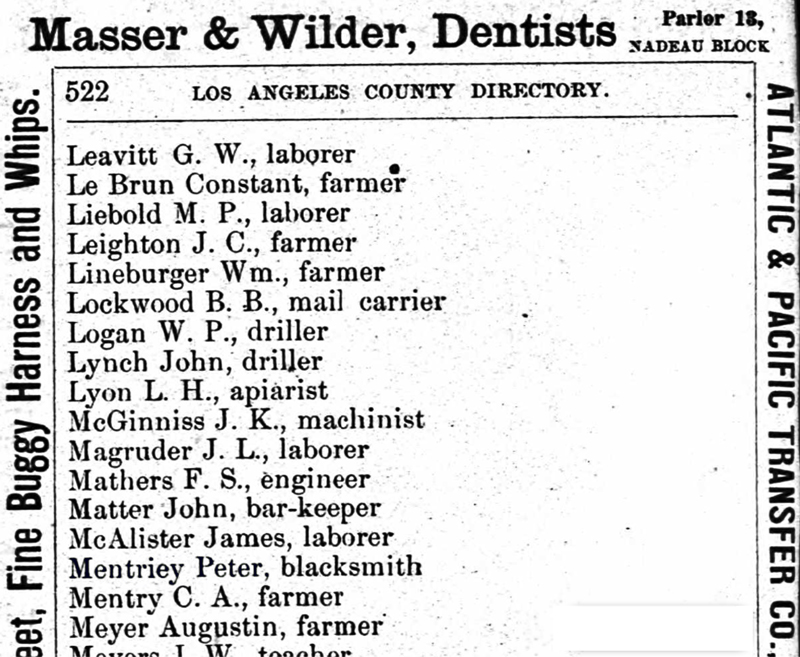|
|

L.A. County Voter Registration log book, 1884 | Click image to enlarge Mentrier? Menetrier? Menestrier? None of the above? Until we see his French birth certificate, we might not be fully certain of the birth name of the man who, in 1876, put California on the "oil map" of the United States at a place called Pico Canyon, a few miles west of present-day Newhall. In his 1985 book, Pico Canyon Chronicles, SCV historian Jerry Reynolds gives Charles Alexander "Alec" Mentry's birth name as "Menetrier" and says he emigrated to the U.S. with his parents in 1853, at age 7. Elsewhere, Reynolds says the name was "Mentrier" and gives a birth year of 1846. Mentry's death certificate says he was born March 27, 1847, but the death certificate is inaccurate. It says he was 52 years, 6 months and 8 days old when he died Oct. 4, 1900 — and that would move his birth to 1848. And it doesn't show a birth name. A distant relation from Glendale, Calif., provides a different spelling. "His name was Menestrier," Harry Minetree tells us in a communication of Jan. 19, 2014. "The name was changed to Minetree in England. (The common ancestor) was a French Huegonot, a Protestant, exiled from his country by a Roman Catholic French king in the mid-1600s. The Menestriers go back to the Middle Ages when the name was spelled Mennestrier; they were a large group of wandering minstrels, noblility who codified Courtly Love. David Minetree, who came to the New World in the late 1600s, was the designer and builder of Carters Grove, a famous plantation on the James River in Virginia. I am Harry Minetree, from the Virginia Minetrees."
The Los Angeles County voter registration roll for 1884, shown above, offers another variation. Alec, then 38 (suggesting a birth year of 1846), registered to vote as "Mentry." But his 75-year-old father, Peter, used the name, "Mentriey." He's also shown as Peter Mentriey in the Los Angeles County Directory for 1884. The voter registration listing tells us Alec became a naturalized U.S. citizen by virtue of the naturalization of his father, which occurred Oct. 6, 1863, at Crawford, Penn. Titusville, Penn., where Alec first went to work as an oil driller, is located in Crawford County. On the 1884 voter rolls, Peter is listed as a blacksmith, which makes sense, while Alec is listed as a farmer, which doesn't. It's probable that the rough pronunciation of Mentriey was "Mentre," inasmuch as that's the spelling used in the newspapers when Peter went missing two years later (1886), never to be seen alive again. Peter's voter registration provides a birth date but not a year; the the news reports say he was 77 when he went missing in August or early September of 1886, but since his disappearance was so close to his birthday (Sept. 25), we don't know if he was born in 1808 or 1809. — Leon Worden 2014 Born Charles Alexander Menetrier (maybe) in France on March 27, 1847 (probably), "Alex" Mentry came to the Newhall area in in 1873 to find his fortune. Already an experienced oil driller who had punched 42 successful wells near Titusville, Penn., Mentry soon landed a job digging wells in Grapevine Canyon, at the southern end of the Santa Clarita Valley. In 1875 he formed a partnership to purchase a claim in nearby Pico Canyon, which had been explored in the late 1860s by Newhall entrepreneurs Sanford Lyon, Henry Clay Wiley and Los Angeles lawman William Jenkins. The claim had produced only moderate results, but it held great potential if only someone with sufficient technical and engineering skills would come along to work on it. That man was Alex Mentry, who punched four new wells (Pico No. 1-4) near the old Lyon-Wiley-Jenkins hole. It wasn't long before a San Francisco fiancier by the name of Demetrius Scofield — himself an old Pennsylvania oil man — caught wind of what was going on outside the sleepy burgh of Newhall. Scofield purchased Mentry's claim in 1876 and convinced the oil driller to come into his employ. Mentry used what may have been California's first steam-powered oil rig to drill a fourth well, which consistenly produced 30 barrels of oil per day. Mentry kept digging. Finally, on September 26, 1876, from a depth of 617 feet, a mighty geyser of oil shot through the 5 5/8-inch casing of his No. 4 well. It was the first commercially successful oil well in the western United States, and Demetrius Scofield was a rich man. Teams of oil workers flocked to Pico Canyon, which was soon being called Mentryville. Alex Mentry married Flora May Lake of New York, who gave him three sons and a daughter. They lived in a 13-room Victorian mansion at the base of the canyon. In 1900, Mentry, already suffering from chronic kidney disease, contracted typhoid fever and was hospitalized in Los Anglees, where he died Oct. 4. He was laid to rest in the Evergreen Cemetery in Boyle Heights, where other family members are also interred. Information from Chevron/Standard Oil records; published works of A.B. Perkins; and "Pico Canyon Chronicles: The Story of California's Pioneer Oil Field" by Jerry Reynolds. Cemetery information from Jack and Joan Beitzel. Further reading: The Story of Mentryville.
|
Eulogy by Scofield 
Death of Son Arthur 1954
|
The site owner makes no assertions as to ownership of any original copyrights to digitized images. However, these images are intended for Personal or Research use only. Any other kind of use, including but not limited to commercial or scholarly publication in any medium or format, public exhibition, or use online or in a web site, may be subject to additional restrictions including but not limited to the copyrights held by parties other than the site owner. USERS ARE SOLELY RESPONSIBLE for determining the existence of such rights and for obtaining any permissions and/or paying associated fees necessary for the proposed use.







